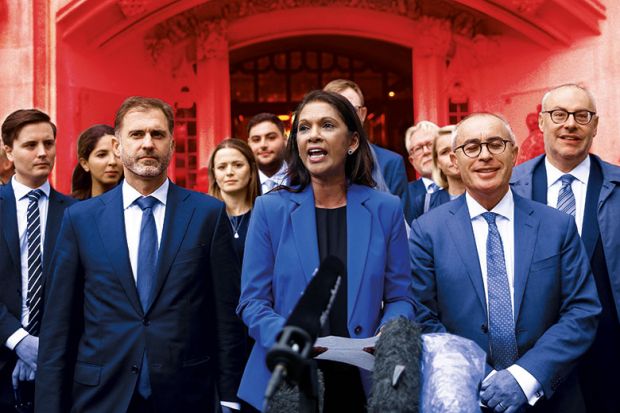The recent Supreme Court case on the UK government’s prorogation of Parliament is but the latest example of Brexit throwing up tricky legal and constitutional questions that academic lawyers can play a useful role in helping to answer.
In an earlier era, law schools were populated by a mix of full-time academics and part-time practising lawyers. The rise of the research excellence framework (REF) and the professionalisation of higher education has diminished the overlap between the UK’s legal profession and academia, creating a clearer divide than is often found in other jurisdictions.
However, the legal teams that have been involved in the most high-profile Brexit-related cases include legal academics who are also barristers – such as UCL’s Tom Hickman QC, who acted for Gina Miller in the successful challenge to the legality of prorogation – and those like myself who are simply full-time academics.
Also of significance is the emergence of online blogging platforms for legal academics and practising lawyers. The influence of these new channels of communication and debate should not be underestimated. The 2017 Gina Miller case on the use of prerogative powers to trigger the Article 50 withdrawal process is a good example of the power of a single blog – written, in this case, by legal academics Nick Barber, Tom Hickman and Jeff King – to shape the litigation that followed.
Academics soon realised that blogging was a fast way to get arguments into the public domain and more directly into legal pleadings. However, the maintenance of personal sites has several downsides. It is time-consuming; it fragments the distribution of communication; and it lacks the academic warrant of a peer-edited domain. The UK Constitutional Law Association’s blog, by contrast, has been a very important test bed of a range of opinions that, following open, ex-post peer reviewing by the legal community, have found their way into arguments presented to the top courts.
With another REF cycle in full swing, it is tempting to think that Brexit and these interactions between the legal profession and the law school are generating research “impact” that will score highly. However, there is a mismatch between this real-time, blog-driven impact and the REF’s view of impact as the sequential outcome of a discrete research process that finds its tangible form in more formally peer-reviewed books and journals.
As the author of a book called Brexit Time: Leaving the EU – Why, How and When?, published a full year after the June 2016 referendum, it seems clear to me that the timelines for traditional academic publishing – and any impact they could produce – are hard to reconcile with the ever-changing political landscape of Brexit.
The rise of social media, and especially Twitter, has facilitated a process of exchange and dialogue even more rapid than the blogosphere. Significantly, it has created virtual legal communities that might otherwise struggle to form. The visibility this affords to lawyers and legal academics clearly facilitates a communicative and educational function, but it also suffers from the standard social media problems of producing echo chambers and facilitating vitriolic trolling, particularly of women lawyers.
Social media is, therefore, a double-edged sword. On the one hand, given the paucity of positive feedback loops within academia itself, there is clearly something seductive about being “liked” and “retweeted”, and of watching your number of “followers” grow. On the other hand, the exposure can come at a personal price, and can diminish the very nuance and reflectiveness that makes us academics in the first place. My evaluation of both the 2014 Scottish independence referendum and the aftermath of the European Union referendum is that subtlety is easily lost in the febrile communications around highly contested political matters.
The fundamental question is who benefits from this Brexit-influenced interaction and exposure? I view my own recent engagements with the legal profession very positively. The utter professionalism and teamwork of practising lawyers has been nothing short of inspiring. I also think there is no doubt that legal academics have had a profound effect in answering difficult legal questions. Yet for academics who already have to balance portfolio careers as teachers, researchers, managers and editors, these new demands can be just another plate to spin.
My anxiety increases when it comes to feeding the beast of the Brexit running commentary. Academics have done an enormous public service in their willingness to help the media fill slots to opine on the latest Brexit twists and turns. I feel that academics remain trusted by a population that despairs of our politics and our politicians. But I don’t think that punditry is a substitute for deeper academic reflection.
More importantly, it is not clear to me that there has been a wider social impact. Notwithstanding the distrust of politicians, I fear that Brexit remains refracted through the prism of party politics far more than through the lens of academic analysis and reflection.
Kenneth Armstrong is professor of European law at the University of Cambridge and was part of the legal team led by Aidan O’Neill QC that advised Joanna Cherry QC MP and other parliamentarians in their legal challenge to the prorogation of Parliament.
- Want to write for Times Higher Education? Click here for more information.
Register to continue
Why register?
- Registration is free and only takes a moment
- Once registered, you can read 3 articles a month
- Sign up for our newsletter
Subscribe
Or subscribe for unlimited access to:
- Unlimited access to news, views, insights & reviews
- Digital editions
- Digital access to THE’s university and college rankings analysis
Already registered or a current subscriber? Login









